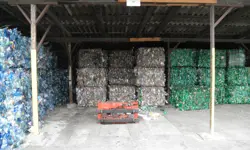
Q&A: Dr Anh Tran

Dr Tran studied chemical and biomedical engineering before becoming a humanitarian engineer
Why did you first become interested in engineering?
My family has always encouraged higher education as a way to move up in life and my primary school teacher inspired my love of science through our lessons on space. I wanted to be an astronaut. In my first year of studying engineering at university, I realised that there were more problems on earth that needed solving than in space – challenges such as poverty alleviation and environmental degradation. Hearing about the hole in the ozone layer as I was growing up, I could see that engineering and technology could be part of the solution to the global challenges of our generation.
How did you get to where you are now?
I studied English, maths, physics, ICT and chemistry at school in Australia. At university, I studied chemical and biomedical engineering as I felt it was a people-centred engineering discipline. After that, I started a PhD in pharmaceutical engineering and then joined my local Engineers Without Borders (EWB) chapter. EWB encourages engineers to make a difference to people through exploring solutions to the most pressing global development issues. I volunteered in Cambodia for a year and then returned to Australia to work with EWB Australia leading the EWB Challenge, which is a design challenge for first-year university students to investigate how technology can solve problems in resource-limited settings. This was a hugely rewarding job that involved inspiring a new generation of engineers to see that their skills could be used in a humanitarian context. I then worked as a researcher, completed my PhD, and had a family before landing my dream job as a humanitarian engineer in the UK and becoming involved with the UNITWIN/UNESCO Network for Humanitarian Engineering. As the daughter of Vietnamese refugees my work on sustainable energy in refugee and host communities is very meaningful to me. It brings a sense of circularity to my career as an engineer.
As the daughter of Vietnamese refugees my work on sustainable energy in refugee and host communities is very meaningful to me. It brings a sense of circularity to my career as an engineer
What has been your biggest achievement to date?
I have two career achievements that I’m proud of. First, working to develop the EWB Challenge and then becoming the first international coordinator. The project has now expanded from Australia and New Zealand to all across the world, including the UK. Second, I successfully secured a £1 million research project to investigate sustainable energy in refugee camps in Rwanda and Nepal.
What is your favourite thing about being an engineer?
The endless possibilities of how engineering and technology can have an impact on our world, and particularly in low-resource settings. My favourite part is working as part of an interdisciplinary team to collaborate and co-design with communities to develop technological, social and business solutions to improve their quality of life.
Quick-fire facts
Age:
30s
Qualifications:
Bachelor of Chemical Engineering with Biomedical Minor (Honours), PhD in Chemical Engineering.
Biggest engineering inspiration:
Professor Peter Guthrie OBE FREng at the University of Cambridge. In 1980, he founded the Register of Engineers for Disaster Relief (now RedR) following his experiences working in refugee camps during the Vietnamese refugee crisis.
Most-used technology:
My mobile phone, laptop and internet connection – my office in a bag.
Three words that describe you:
Passionate, curious and a friend once described me as a “ball of fire with hair” – sounds about right.
What does a typical day at work involve for you?
At the time of writing, I’m in Vietnam at the Royal Academy of Engineering Frontiers of Engineering Development (FoED) symposium discussing engineers’ role as healthcare practitioners. Last week, I was in the US presenting at the IEEE Global Humanitarian Technology Conference and before that, working with Brazilian researchers on Internet of Things applications in agriculture for smallholder farmers in São Paulo, as part of an FoED grant. When I’m not travelling, I spend a lot of my time working collaboratively with my international partners using online communication tools. My top tip for working successfully on global research projects is a strong relationship with local partners who understand the local context and are experts in their domain.
What would be your advice to young people looking to pursue a career in engineering?
Engineering is diverse and there are many opportunities to apply science, technology, design, social science, and business solutions to solve the global challenges we face today. Follow your passion and hopefully someone will pay or fund you to do it. I especially encourage young, aspiring women and those from minority backgrounds to pursue a career in engineering, as voices from different backgrounds enrich engineering and bring new ways of thinking.
What’s next for you?
I’m working on a number of research projects. As a member of Global Plan of Action for Sustainable Energy Solutions in Situations of Displacement – a framework that aims to progress safe access to affordable, reliable, sustainable, and modern energy services for all displaced people by 2030 – I’m supporting Sustainable Development Goal seven (affordable and clean energy) for refugees and host communities through my research. I’m also collaborating with Australian researchers to develop a low-cost tsunami early warning system in the Indo-Pacific region that doubles as a community radio station and education tool.
***
This article has been adapted from "Q&A: Dr Anh Tran", which originally appeared in the print edition of Ingenia 78 (March 2019).
Keep up-to-date with Ingenia for free
SubscribeRelated content
Environment & sustainability

The extreme engineering behind life on an Antarctic station
Antarctica is one of the most challenging environments on the planet, but of enormous scientific importance to humanity. Technology and engineering is essential to enable the British Antarctic Survey's researchers to pursue their science effectively in this awe-inspiring landscape.

Recycling household waste
The percentage of waste recycled in the UK has risen rapidly over the past 20 years, thanks to breakthroughs in the way waste is processed. Find out about what happens to household waste and recent technological developments in the UK.

Upgrade existing buildings to reduce emissions
Much of the UK’s existing buildings predate modern energy standards. Patrick Bellew of Atelier Ten, a company that pioneered environmental innovations, suggests that a National Infrastructure Project is needed to tackle waste and inefficiency.

An appetite for oil
The Gobbler boat’s compact and lightweight dimensions coupled with complex oil-skimming technology provide a safer and more effective way of containing and cleaning up oil spills, both in harbour and at sea.
Other content from Ingenia
Quick read

- Environment & sustainability
- Opinion
A young engineer’s perspective on the good, the bad and the ugly of COP27

- Environment & sustainability
- Issue 95
How do we pay for net zero technologies?
Quick read

- Transport
- Mechanical
- How I got here
Electrifying trains and STEMAZING outreach

- Civil & structural
- Environment & sustainability
- Issue 95